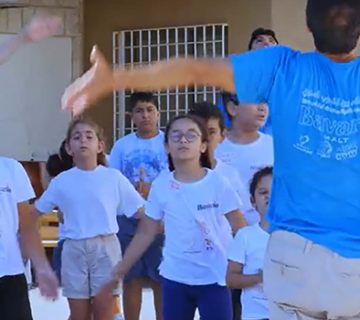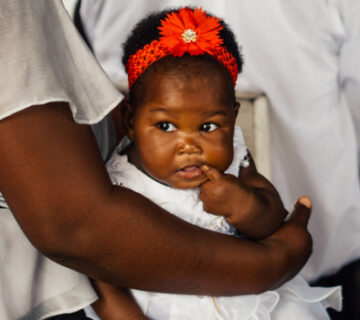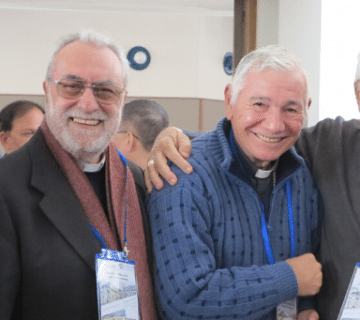 “It’s like being in prison”, hostages in their own homes, without a chance to meet. This is one of the most common feelings in countries affected by the Ebola virus, and shared by Antoinette, one of the young members of the Focolare Movement in Sierra Leone. “This virus seems to make us more selfish and distrustful towards each other; it does not allow us to go freely to meet our friends.” That’s why Antoinette has plucked up her courage and decided to prepare meals for some families, neighbours who were left with nothing to eat during the three-day quarantine that prevented them from going out.
“It’s like being in prison”, hostages in their own homes, without a chance to meet. This is one of the most common feelings in countries affected by the Ebola virus, and shared by Antoinette, one of the young members of the Focolare Movement in Sierra Leone. “This virus seems to make us more selfish and distrustful towards each other; it does not allow us to go freely to meet our friends.” That’s why Antoinette has plucked up her courage and decided to prepare meals for some families, neighbours who were left with nothing to eat during the three-day quarantine that prevented them from going out.
A very difficult human drama is unfolding: “People see their loved ones die or taken to specialized centres for Ebola. These are places far from here – Father Carlo Di Sopra of the diocese of Makeni writes – and many, once they leave, do not come back. The families do not know anything more about them or they about their families. So we can understand why some are hidden and others prefer to die in their own villages. But like this the virus spreads and kills even more victims.”
Yes, because what must be defeated is not only the virus, but also ignorance: people are asking themselves: is there really Ebola or is it just propaganda? Who has caused this illness? Maybe they just want to sell us the vaccine to make a profit? – writes Carlo Montaguti, a doctor Focolarino in Ivory Coast who conducted a study on the Ebola epidemic which is published in the latest issue of Nouvelle Cité Afrique. To this we could also add the so-called healers, such as the Liberian woman who attracted patients from neighbouring Guinea, contributing to the spread of the epidemic in Liberia. And the failure of the national health systems, their failure to respond vigorously to such an emergency and especially the lack of means. “In cities like Monrovia (the capital of Liberia), with 2 million inhabitants, the majority of hospitals and health centres are closed for fear of contagion. So it is not only difficult to treat Ebola, but all other diseases as well.” A situation that should be taken on by the international community, as Pope Francis suggested in his recent appeal.
 “We are establishing an ‘Ebola Fund’ to help those most affected” – continues Father Carlo. “We received material help from the Focolare Movement in the Ivory Coast that we are now distributing. There are many orphans: the virus is decimating at times whole families. Another religious priest, Father Natale, is desperately trying to find a foreign team that has a laboratory that can test for the virus and that can come here in the north.” He continues: “In these days two of our religious have had a high fever. It was probably malaria, because the fever has now gone, but at the beginning there is always a certain apprehension and you feel unarmed, right in the hands of God. There are more and more cases and some not very far from our house. The area of Kabala that had not yet registered any cases now has some. News arrives that the virus is out of control, especially as it has taken root in the cities. There is great uncertainty.” In addition, it is not possible to travel as before, because the district is quarantined.
“We are establishing an ‘Ebola Fund’ to help those most affected” – continues Father Carlo. “We received material help from the Focolare Movement in the Ivory Coast that we are now distributing. There are many orphans: the virus is decimating at times whole families. Another religious priest, Father Natale, is desperately trying to find a foreign team that has a laboratory that can test for the virus and that can come here in the north.” He continues: “In these days two of our religious have had a high fever. It was probably malaria, because the fever has now gone, but at the beginning there is always a certain apprehension and you feel unarmed, right in the hands of God. There are more and more cases and some not very far from our house. The area of Kabala that had not yet registered any cases now has some. News arrives that the virus is out of control, especially as it has taken root in the cities. There is great uncertainty.” In addition, it is not possible to travel as before, because the district is quarantined.
And over the weeks Father Carlo confides that he has understood that “this is not just a remote corner of the world, as I called it before, but it is ‘the heart of him that Chiara Lubich called Super-Love’.” Jesus Forsaken, who on the cross cannot find answers, but continues to love. It is the only weapon left, powerful, because it helps us not to lose hope, to remain united, praying for the sick: “they can take away the possibility to meet each other, but the presence of Jesus among us can be established beyond the closed doors of homes,” writes a young man. And another: “Yes, this is our impression. It’s like being in prison, but even there we can still love.”


 Italiano
Italiano Español
Español Français
Français Português
Português



No comment